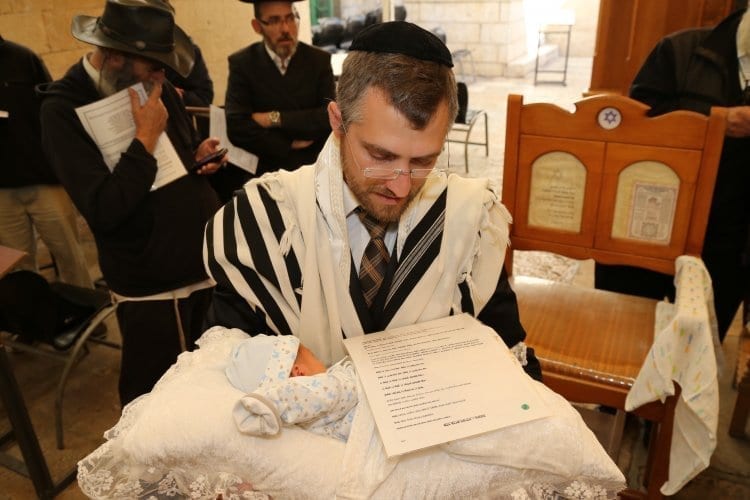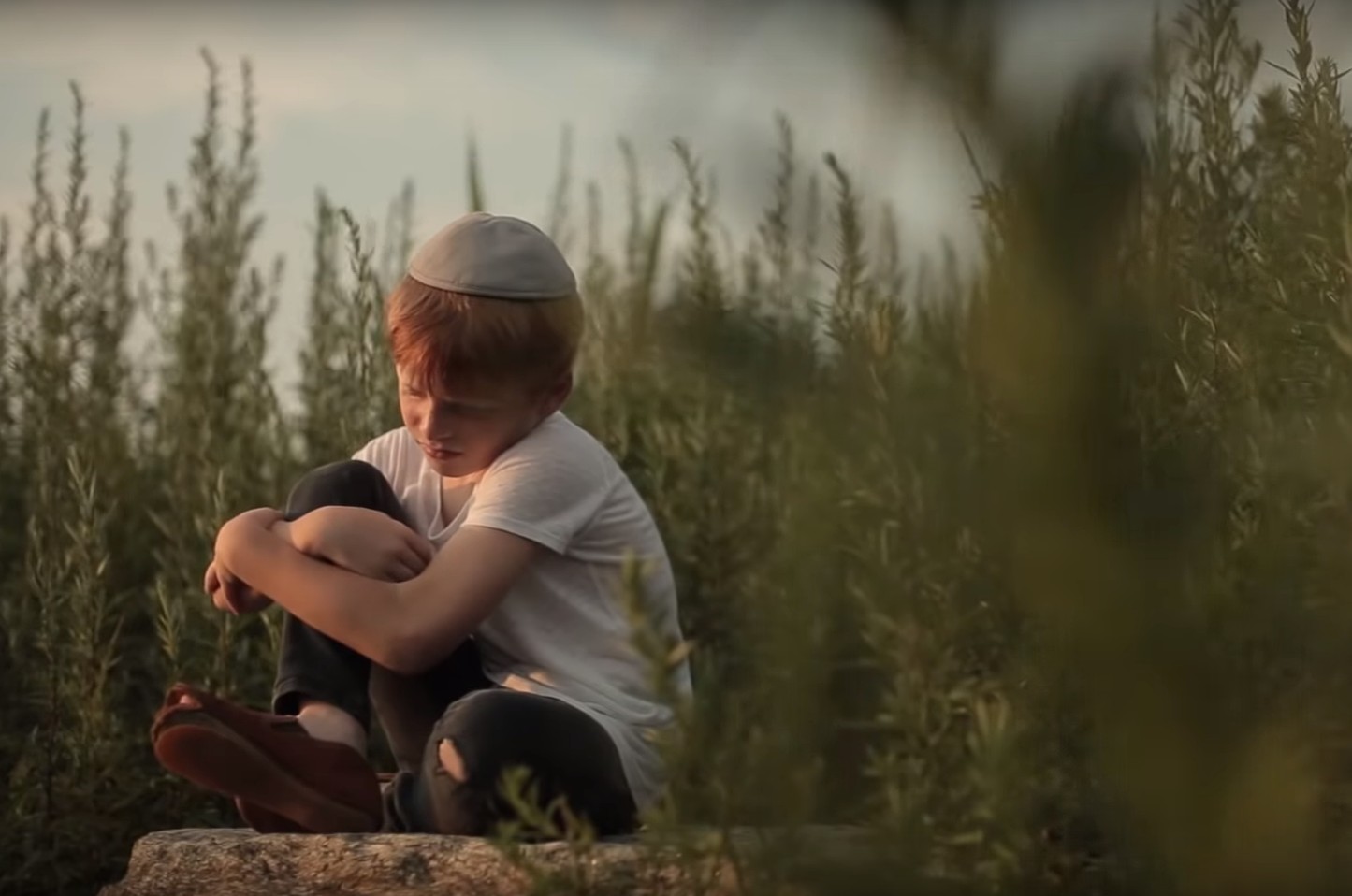I clearly remember exactly where I was standing when the phone rang. It was two days to Pesach. Our well-worn kitchen, finally scrubbed clean, was in the process of being kashered. A huge vat of hot water was bubbling on the stove, half the counters were covered with two inches of water, and the floor was a mess of muddy sludge. This was D-Day, the final preparations before the grand Pesach cook-off. This year, my sister Dassy and her children were coming for the Sedarim, which meant we needed a lot of extra food. Splash! My husband spilled a pail of boiling water. I stood at the ready, spreading rags to soak up the spill as my two teenaged boys tackled another counter. And then the phone rang. “Mommy, it’s for you,” said my 14-year-old daughter Shana. “Take a message, Shana. This isn’t a great time…” “Mommy, it’s her. Mrs. Bronstein.” I grabbed the phone out of her hand. “Hello?” “Rina? It’s Chava. Chava Bronstein.” Why did she bother with her last name? Why the formality? There was something about her voice that made me feel cold inside. “Oh. Just give me a sec.” I grabbed the cordless phone, ran into the laundry room and firmly shut the door. “Okay. I’m available now. So did Shaya want to schedule anoth…” “I’m sorry, Rina.” Chava sighed. “I’m really, really sorry.” “Excuse me?” I wasn’t sure I understood.

Or perhaps I didn’t want to understand. “It’s over. Shaya says she’s not for him.” Nooooo! A primal cry burst from the depths of my being. “W…what happened?” “We’d rather not say. We just…it isn’t easy for us, you know. It’s hard, Yehudis being a new yesomah and all. But still. We can’t see this happening.” “Can you just tell me why?” I cried out. “You can’t just…just change your mind out of the blue without giving me a reason.” I know I sounded ridiculous, but I was beyond caring. “I’m sorry. We gave this a lot of thought. Shaya discussed it with his rosh yeshivah at length, and he feels that this is the right thing to do. I…I hope we can still be friends.” Chava was utterly composed, almost frigid in her determination. I was in a state of shock, unable to act or think rationally. “I can’t believe this,” I stammered. “I thought this was a done deal. How many times did they go out already? Four? Five?” “Five times. But we never made any type of commitment. And it’s best to make a clean break before Yom Tov, just to give them a chance to digest the news. So you’ll call your sister and tell her, okay? I’m really sorry. This is very awkward for all of us.” “Wait. Chava. You…you can’t do this to me. How can I tell my sister? It will literally kill her.” “Don’t throw guilt on me,” she said, annoyed. “I can’t force my son to marry Yehudis out of pity.” “I understand. But can’t he just…just give her another chance?” “I’m afraid not, Rina. Goodbye.”The line went dead. I stood there for a few moments holding the receiver, my entire body shaking.
Hashem, please help me. How am I going to tell my poor sister the news? “Mommy, is everything okay?” Yanky, my strapping 16-year-old son, asked as he poked his head into the laundry room. “We need you in the kitchen. Everything’s flooded.” “Coming,” I said, focusing on what he was saying with tremendous effort. I ran back to the kitchen, my mind a million miles away, and promptly slipped in a puddle of water, landing flat on my back. “Ouch!” I cried, trying to sit up as a sharp pain sliced through my spine. Instantly my husband and sons surrounded me, urging me to take it easy, to get into bed and rest. Despite my agony as I hobbled to my room, I was grateful for the reprieve. It would give me a chance to figure out what to say to Dassy. I fell onto my bed, wincing in pain. I gratefully accepted the Aleve and glass of water Yanky brought me, and focused on breathing through the agony. As I took deep, cleansing breaths, I thought of my younger sister and what she was doing now. She was probably in her kitchen peeling a mountain of apples.
Dassy had offered to bring the compote, and I hadn’t refused. Without thinking, I reached for the cordless and dialed her number. “Hello? Dassy?” “Rina! I’m just on the way to the supermarket to stock up on the stuff we’ll need for Pesach. Do you think you’ll have enough maror? Or should I bring my own?” Poor, poor Dassy. She had enough maror in her life to feed the entire community. “Yanky’s in charge of maror. I’ll check with him. But I’m sure there’ll be enough. How’s it going with the compote?” “To tell you the truth, I was going to do it yesterday, but I was so exhausted. I just can’t find the energy to peel all those apples. Can I back out?” “Of course. Not a big deal. Shana will take care of it, so don’t you worry. What else is new?” “You tell me.” Dassy’s voice dropped a notch. “Did you hear from them? Do they want us to meet on Chol Hamoed?” “Uh, I’m not really sure,” I fibbed. “I don’t feel comfortable calling on Erev Pesach.” “Yeah, but this is important.” She sighed. “Yehudis is so excited. She just feels it in her heart—no doubts, no second thoughts, nothing. Can you imagine? My little girl is almost engaged. And Chaim is not here to see it happen.” The silence stretched. “You know, sometimes I think that this shidduch—it’s just so bashert that it’s happening right now, our first Yom Tov without Chaim. He…he wanted this so badly. He davened for it, even when he was already on oxygen in the ICU.
And now that he’s in a better place, he arranged it for us.” “Hashem should help that everything should work out,” I said, a fervent prayer on my lips. Oy, my poor, dear sister. If only you knew the truth! “So what do you think Yehudis should wear for her next date? You think he’s going to propose on Chol Hamoed? Won’t that be exciting? But hey, what am I going to serve at a vort? Almonds and macaroons?” She laughed. “Chaim always used to say that he wants our children to become engaged on Pesach so that he’ll save money on the vort. But Pesach food costs an arm and a leg.” “Tell me about it,” I commiserated. “Well, maybe it’ll wait until after Yom Tov, and then you won’t have to worry about the menu.” “I don’t want to wait till after Pesach, Rina. Don’t you understand? This simchah is what’s keeping us going. Until this shidduch came up, all we did was cry. Yehudis took it harder than the others. She’s the oldest, and she had a special relationship with Chaim.” My sister was crying now, little hiccups punctuating her words. “If only she becomes a kallah this Pesach. It’ll be so beautiful, so special.” “Hashem should hear our tefillos,” I whispered. I felt nauseated. How could I tell Dassy the truth? “Okay, I found parking. Gotta go. But keep me posted, okay? We’re ready as soon as they are.” I lay back on the pillows, feeling a pounding headache between my temples.

This was all my fault. If I hadn’t suggested Shaya Bronstein for my recently orphaned niece, I wouldn’t have gotten into this mess. In my defense, I meant well. And this shidduch had had so much potential! Yehudis was a gem of a girl, brilliant, with wonderful middos, tall and beautiful. My sister Dassy had raised a wonderful family, but Yehudis was a cut above. I’d had my eye on Shaya Bronstein, whose mother was my gym partner, for a long time. But every time I asked as we puffed and panted on our ellipticals, Chava laughingly told me her Shaya wasn’t interested in shidduchim. “He’s shteiging away. He doesn’t want to get married yet,” she explained. “But as soon as he changes his mind, we’ll let you know.” For nearly two years now, the answer had been the same. In any case, my niece Yehudis had still been in high school, not nearly old enough for shidduchim. And then came the day her father, my brother-in-law Chaim, was diagnosed with cancer. He had been feeling unwell for weeks, complaining of fatigue and pain in his back, and had barely had the energy to go to work. My sister finally schlepped him to the doctor, certain that all he needed were vitamins and more sleep. Chaim had kept a punishing schedule, getting up at dawn for his Daf Yomi shiur before davening and then going to work as a commodities broker.
He got home late in the evening, ate a quick supper and went to learn again. “I hope the doctor will knock some sense into him,” she told me that morning, before she got the news that would change her life. “He has to take care of himself, you know. We’ve got eight kids to marry off.” The next time I spoke to Dassy, she was reeling with shock and pain. The doctor had run a few tests and told her to take her husband to the nearest emergency room. His white blood count had been off the charts. “The doctor suspects something serious,” she told me, her voice slurred from stress. “We…we’re going to get to the bottom of this. Daven for me, Rina.” So I did. We all did. We davened and undertook kabbalos, said Tehillim and gave tzedakah, and sponsored shemiras halashon campaigns as a zechus for Chaim ben Hentcha. We galvanized the community to help with suppers and arranged for volunteers to do homework with Dassy’s children. We stood at her side as her husband went through the agony of several surgeries, chemotherapy and radiation. We raised large amounts of money to pay for full-time household help and therapy for the children. But most of all, we were always there to listen, to hold Dassy’s hand and help her stay strong as she watched her husband fade a little each day. “We’re very sorry,” the doctors finally told Dassy shortly after Chanukah. “There’s nothing we can do.
Take him home and make him comfortable until the end.” When she heard those stark words, Dassy fell apart. She was exhausted from the effort of caring for her eight young children and spending weeks on end in the hospital. Yehudis, her eldest, was in seminary abroad, but she was summoned home shortly after Chanukah to be with the family during her father’s final weeks in this world. Chaim, my dear brother-in-law, lapsed into a coma two days after Tu B’Shvat. He was niftar three days later with a minyan saying Shema at his bedside. At the heartrending levayah, my husband was among the maspidim. He promised in a tear-choked voice that we’d take care of the yesomim.It was a promise I didn’t take lightly. I was there for Dassy every day during the shivah—and afterwards, when she needed me more. My brave sister tried desperately to be both mother and father to her children, but the wound was still so fresh. We spent many nights together, Dassy crying on my shoulder, and then I would help her get her kids off to school in the morning. Her daughter Yehudis was a lifesaver during this chaotic time.
A few days after the shloshim, when I’d finally returned to my exercise class, my joints achy from disuse, I met Chava, who was busy working up a sweat. “Great news!” she told me. “My Shaya is ready to start shidduchim.” “I have a great girl for him.” I told her. “Take a number and get on line.” Chava joked “Chava, I’m serious. You won’t find such a girl in a million years.” I told her a bit about my niece Yehudis. Chava replied in a pareve tone that she’d look into it, and I gave her references. But I didn’t get my hopes up too high. Top boys had lists a mile long, not to mention price tags. To my absolute surprise, Chava called me three days later to say she’d heard wonderful things about Yehudis, who had been described as a “gem of a girl.” As soon as I got the go-ahead, I told Dassy to make her own inquiries. Shaya and Yehudis met for the first time on one week later. I had never redt a shidduch before and was a bundle of nerves all night. When Shaya walked Yehudis to her door six hours later, Dassy called me right away, laughing and crying. “She looks radiant,” she said. “I think this is it.” Shaya felt the same way because he agreed to see her again two days later. I was kept busy coaching, guiding, advising and being a sounding board for both sides.
In hindsight, though, it wasn’t a two-way street. From the start, Dassy and Yehudis had been gung-ho about the shidduch, while the Bronstein’s had been more hesitant, wondering if they shouldn’t give it more time. I reminded them that if the couple felt ready, there was no reason to prolong the agony. Let them just get engaged already! “I can’t tell you what this shidduch means for us,” Dassy told me late one night, about a week before Pesach. “It’s the difference between dreading Pesach, my first Yom Tov as an almanah, and actually being excited. I feel empty and full at the same time. It’s weird.” “I hope we still have a simchah before Pesach,” I said to her, and went to bed with her heartfelt amen ringing in my ears. And then came the phone call that caused me to lose my balance, twist my back and lie in bed, writhing in pain. My physical agony was a joke compared to my emotional agony. I kept visualizing poor Dassy’s face crumple as I told her that the shidduch was over. Sure, she would put on a brave face and tell me it wasn’t bashert, but I knew that Pesach would be a gehinnom.
No. I couldn’t tell her, I decided. Not until after Pesach. I also decided not to tell my husband, Meir, about the latest development because I knew it was hard for him to keep a secret. No one would know about this until after Pesach. The first Seder night. The first Yom Tov without Chaim. The table was set with the finest silver and crystal, stylish chargers and glassware adding a festive touch. We had added another “forever” table to make room for Dassy and her children. Yet despite the festivities, the pain was raw and vivid. On this “night of all nights,” Chaim’s absence was keenly felt. As my husband expertly conducted the Seder, trying to engage all the adults and children, I kept on glancing at Dassy. She was sitting next to Yehudis, clutching her hand tightly for support, her eyes brimming with unshed tears. I’m so glad I didn’t say anything, I told myself. Imagine how much worse it would have been.
But my decision didn’t seem quite as heroic the following dayduring the meal, when Dassy grilled me about whether I’d spoken to Chava. “Nu? Any news about the shidduch?” Now, in the spring sunlight, Dassy looked younger, less harried and almost ebullient. She was wearing a pretty sweater that accented her blue eyes. “The Bronsteins want to wait until after YomTov,” I said with great difficulty. “Their married children came from Eretz Yisrael, and it’s been hectic.” Dassy frowned. “I’m afraid that’s just an excuse. Shaya doesn’t need to babysit his nieces and nephews.” “Perhaps she wants a clear head for the simchah,” I said. “People have different ways of doing things.” Dassy shrugged. “Can you call them on Chol Hamoed and tell them its not good to push things off.” Ouch. Though I’d prepared a delicious roast and extravagant side dishes, I suddenly lost my appetite. I left the table before dessert, claiming a headache, and went to my room. I couldn’t face Dassy knowing that the shidduch was over. Why hadn’t I said anything before Pesach? How could I have been so cruel? The first days passed quickly, and Dassy went home with her family. She’d be spending Chol Hamoed and the second days with Chaim’s parents. She called me once or twice wanting to know what was happening, but I told her firmly that the Bronsteins wanted to wait until after Pesach.
Dassy was very upset. I commiserated and tried to end the call as quickly as possible. Just the thought of telling her the truth after Pesach made me feel cold all over. “Hashem, help me find the right words,” I davened. It’s ironic how many weeks and months we prepare for Pesach, and yet how quickly it passes, like granules of sand in an hourglass. Suddenly the second days were over and it was time to scrub the Pesach inserts, remove the countertops and store them in the attic until next year. The phone rang as I was scrubbing the stove. It was Dassy. “So what’s doing?” she asked, getting straight to the point. “Call them. Now.” “I’m going to call them first thing in the morning.” “Please. We’ve waited long enough.” This was it. Yom Tov was over, and I had to tell her. But it could wait until the next morning. I continued scrubbing and packing all night long, my mind in turmoil. How was I going to break the news to my sister the next day? I had a sudden insane urge to escape to Timbuktu.
The phone rang. I let it go to voice mail. I was in no mood to talk to anyone. “Hello, Rina? It’s me, Chava. Call me back.” My fingers were trembling as I pushed the buttons. It took me three tries to get the number right. “Hello, Chava? It’s Rina. What’s doing? How was Pesach?” Chava cleared her throat. “Ahem. You see, it’s like this. I know it’s Motzaei Pesach and you’re probably busy, but I wanted to talk to you about the shidduch.” “Shidduch? Didn’t you tell me it was over?” “Yes, I did. But my Shaya had a change of heart. He just returned from seeing his rosh yeshivah, and he told me he wants to see her again. Is she still available?” “Y…yes, she’s still available,” I stammered. “When do you want to set up a meeting?” “How about tomorrow?” Music to my ears. “Thank You, thank You, thank You, Hashem,” I whispered, dancing around the room. “Anytime tomorrow would be fine. I hope Yehudis isn’t too upset. I want you to know it was nothing personal. Just…there were certain issues that were bothering Shaya, but he had some time to think and is okay with them now.” “That’s wonderful! No, of course Yehudis is not upset. I’m just so glad Shaya changed his mind.” My heart sang as I called Dassy to set up another date. “Oy, baruch Hashem!” she said to me. “I was beginning to worry that the shidduch was off. It was probably just my overactive imagination.” “Of course it was!” I assured her. “Now go get some rest and tell Yehudis to do the same. Tomorrow’s going to be a long day.” And so it was. At the vort, I embraced Dasst, and our tears mingled. The subterfuge had been painful but well worth it.




